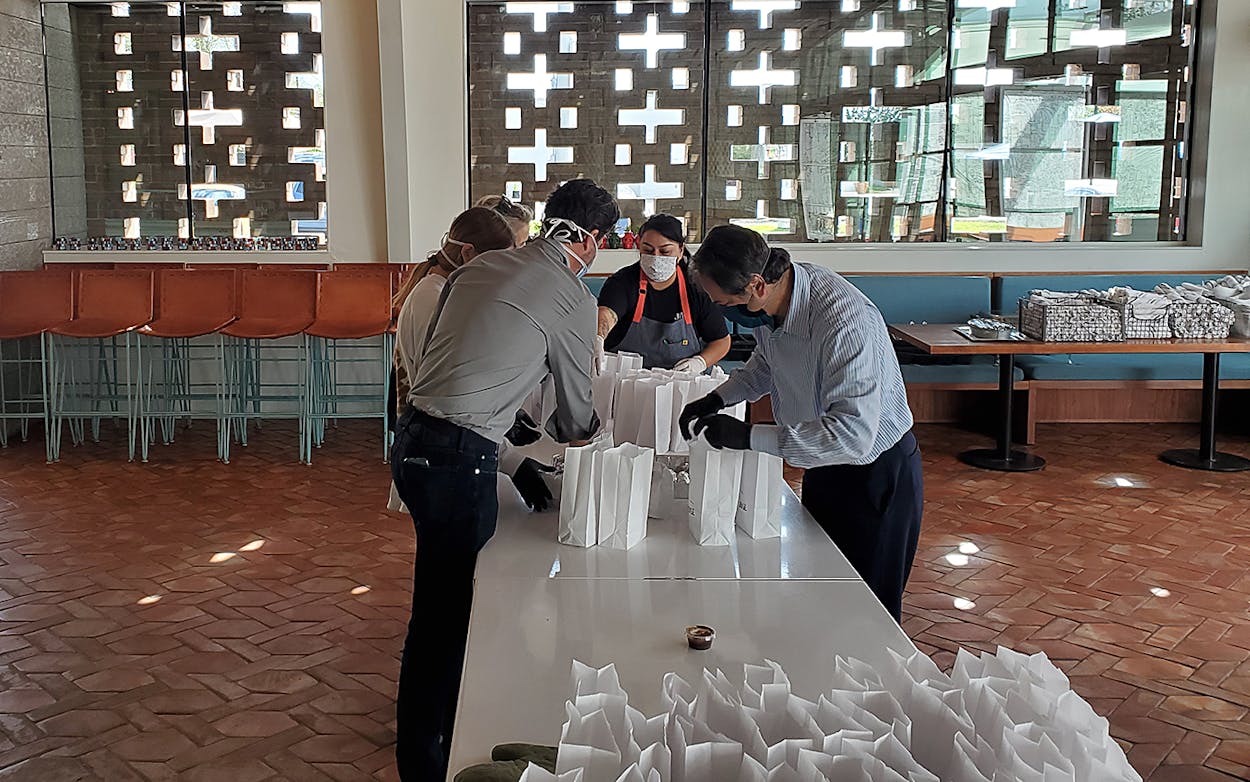What are we going to do now? It’s a question the restaurant industry has asked itself as the coronavirus pandemic continues. For Brady Wood and Dr. Megan Wood, owners of the modern Mexican restaurant José in Dallas, and executive chef Anastacia Quiñones-Pittman, it meant paring down from approximately fifty full-time and part-time employees to a handful of workers pivoting to a delivery and to-go model. But to continue operating, they also needed rent relief from landlords Mark and Juliette Moussa—who, when approached, responded with an immediate “of course.” Together, they devised a plan to bring back as many kitchen workers as they could to do what they all love: feed people. But this time, they wanted to make a concerted effort to help the frontline staff at two Dallas hospitals who are treating coronavirus patients.
Megan Wood, who trained health-care workers at UT–Southwestern Medical Center and Parkland Hospital, was all too aware of the difficulties hospital employees go through on a daily basis. Empathy drove her to propose providing food for the staff at the two hospitals. The Moussas agreed to pay for the meals. “They came up with this super incredibly nice idea to have me bring back some kitchen staff to make tacos every day of the week,” Quiñones-Pittman told me a couple of weeks ago. She calls them “five hundred sack lunches.” They’re made by the eighteen employees they were able to bring back for this endeavor.
Chef AQ, as she’s known in the industry, took time to speak with Texas Monthly about the generous project, which is operating longer than initially planned thanks to monetary donations.
This interview was edited for clarity and brevity.
Texas Monthly: When did you start making tacos for Parkland and UT–Southwestern hospital staffers?
AQ: We started March 31. Monday through Friday. Five hundred sack lunches, basically, two tacos each and a salsa, four varieties. We do chicken asada and beef asada, we do carnitas, and we do a vegan. The vegan taco right now is a spiced cauliflower with refried black bean. We’re going to switch it up and see. We’re serving these people who are so busy and they’re just exhausted and they’re working their asses off and then, I started getting messages yesterday from random people that were, like, “you fed my daughter, like, my cousin, my aunt works there.” And I’m just like, “Oh, my God.” I couldn’t stop crying.
TM: Like many other special sack lunches, you put notes in each one.
AQ: Yeah. It says, “We appreciate everything you are doing. Stay healthy. Stay strong. Thank you from the bottom of our heart. From the la [sic] familia of José.” And it has our sketches that we do on all of our ads on the walls and stuff, but it’s just sweet to know they appreciate it as much as we appreciate them. We have no idea what they’re going through. It’s got to be insane and difficult. And if a taco can cheer up their day, even if it’s for like the ten minutes they get to scarf it down, that’s awesome.
TM: How did day one go?
AQ: So, I brought in almost the entire morning crew. We were here at like six-thirty in the morning. … We got started and we were a little, kind of rusty. We didn’t really know what to do. And it took a little longer than we expected, but it went well. It went really, really well. And every time your back hurts because you’re bending over, you’re rolling [tacos], and every like hundred tacos I say, “Remember, guys, who this is for.” “Yes, chef, we remember.” I’m like, “Are you sure, these are for like nurses and doctors?” “Yes, chef. We remember.” “Remember, they can’t see their kids. Remember, they can’t see their loved ones. So it’s really hard for them too. Every time you complain that your back hurts, just imagine being them.” They’re like “Yes, chef!” It was so cool. They were so excited and energetic about it and emotional. So, yeah, we’re really, really excited to be a part of this.
TM: What happens next after you take the tacos from the fresh tortillas up to the hospitals? What’s the set-up?
AQ: We roll them all up in foil and put them in the warmer and pack them in bags twenty at a time in an assembly line. Then, we put them in the hot-boxes, which people were eager to donate. The owner and his daughter both come in here in their SUVs and take them themselves. They’re not allowed to go into the building. [Workers] come out to the car, they take the hot-boxes, and then they bring them back. So as far as I’m told, it hits the ER staff first. Then the managers or the department heads come down and they get some for their departments, and then it just kind of trickles through.
TM: How does this make you feel—not just as a chef, but also as a human being?
AQ: I can’t even talk about it without tearing up. It’s just, it’s overwhelming, lots of emotions. I mean, they change from hour to hour. Mostly gratitude for everyone involved. I’m grateful that I have staff. I’m grateful that we’re making people smile with tacos, which is always what I want. It’s the end result any time you make a taco.








